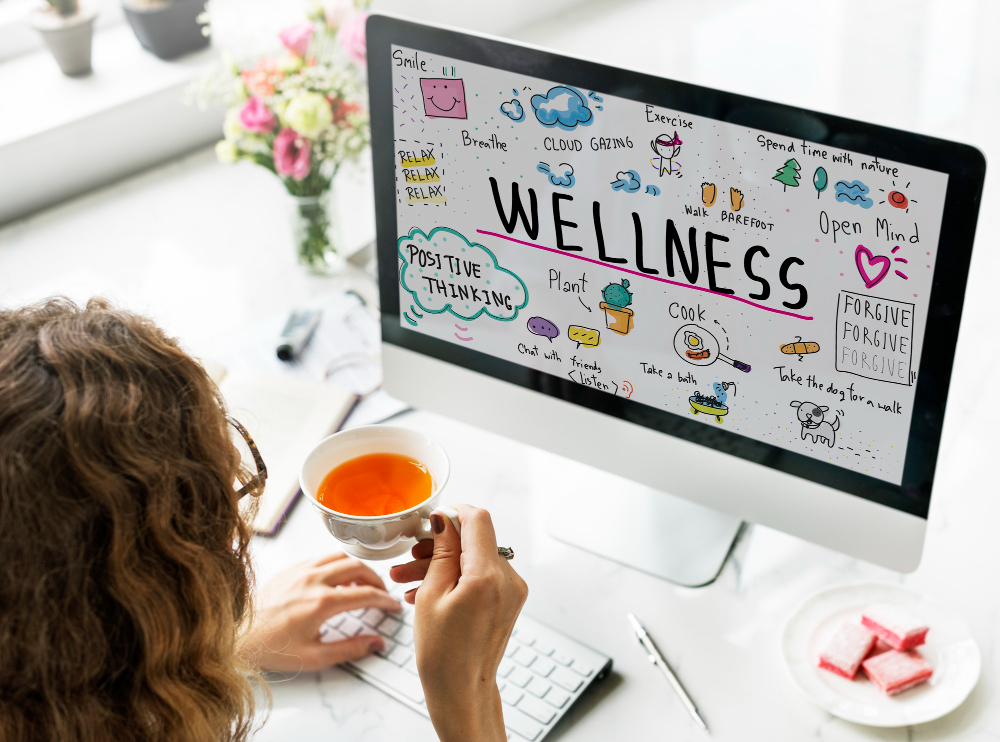Table of Contents
Unveiling the Secrets to a Healthier, Happier You
Everyone strives for better health, be it mental or physical, but very often, this seems to be an uphill task. But what if it weren’t those giant leaps in life that brought us better well-being, but rather the tiny, repetitive steps? If one can unlock the secrets on how to improve their lives, then small, well-planned steps will result in huge long-term improvements.
Such daily habits are very simple yet mighty in reshaping one’s overall happiness and health.

- Why Small Daily Habits Make a Big Difference
Big changes don’t always happen overnight. It’s the little things, day in and day out, that create the real lasting changes. Think of a ship that changes its bearing by just one degree. After some time, that slight shift in course might amount to arriving in a totally different place. The same thing could be said about our actions. That will enable you not to feel overwhelmed by trying to make all the radical changes in lifestyle, while including in your daily routine these little positive and easy actions will certainly help you feel much healthier, more energized, and sharper mentally.
Hydrate at the start of your day.
The very first thing one does in the morning sets the tone for the rest of the day for a well-being. And what better thing is there to start with than hydrating your body? Drinking a glass of water immediately after rising enables one to kick-start their metabolism, clear the toxins, and rehydrate after a night’s rest. It is a small habit, to say the least, but certainly one that sparks life in the body and mind to get up and face the day.
- Drink Water: The First Step to Fueling Your Body
Water is the fuel that keeps all of our systems going. From keeping skin healthy to keeping muscles functioning well, hydration is important. By starting your day with water, you are merely refreshing your system for the intake of the day and building up a pattern for consistent hydration throughout. Think of it as the core foundation that holds the other healthy routines together.
- How Hydration Affects Both Cerebral Clarity and Physical Performance
Proper hydration isn’t just about quenching your thirst. Water keeps your gray matter ticking over, while it also maintains and optimizes physical performance. Even mild dehydration can result in fatigue, concentration difficulties, and mood swings. Muscles and joints alike rely on water to ease into function and avoid cramps or strain. By keeping yourself well-hydrated, you’ll notice improvements in cognitive performance, better energy levels, and an overall sense of vitality.
Mindful Breathing

We often forget to breathe in this hustle and bustle of life. Mindful breathing is one way actually to anchor your thoughts in the present while replenishing your body with oxygenated fuel. It is a swift, powerful technique one can do quickly anywhere that will help peel away stress and free up your mind.
- Deep Breaths, Controlled, Bust Stress
When stress hits, your body responds in an instant-your heart races, your muscles tense, and your breathing accelerates. But a few deep, measured breaths can make the difference between a tense body and a relaxed one. Deep breathing turns on the parasympathetic nervous system, which dampens the “fight or flight” response and leaves you feeling more at peace.
- Breathing Techniques to Instantly Calm Your Mind and Body
Breathe in through your nose over the course of four counts, hold for four, and then exhale for four. This simple 4-4-4 breathing technique can be the secret weapon against stress. Be it on the desk or inside the traffic jam, a prudent little breathing helps get your composure back and clears the fog from the brain.
Micro Workouts to Get You Moving
Not everyone has the time or energy for hour-long sessions at the gym, and that is okay. Micro workouts are small bursts of physical activity that can prove to be just as advantageous. The short motions get your energy up, create better circulation, and quicken the sense of focus, proving the ability to stay active does not have to require a lot of time.
- Why Short Bursts of Physical Activity Can Be Just as Effective as the Gym
According to studies, intervals as little as 10-minute bouts of exercise increase your heart rate, improve cardiovascular health, and burn energy. Take a quick walk around the block, do a set of jumping jacks, or a series of stretching exercises as you sit at your desk. These add up and will keep you physically active all day.
- Easy Exercises You Can Do Anytime, Anywhere
Try these easy moves when you can’t get to the gym: Do a few squats while you’re brushing your teeth, raise up onto your tiptoes while standing in a long line, or do some push-ups against your desk between business calls. Quick exercises that are woven effortlessly into your day incorporate all the same benefits as longer ones, minus the hefty time commitment.
Sleep Your Way to a Sharper Mind
We always make sleep the first casualty in our lifestyle, whereas actually it is an integral component of psychological and physiological health. By sleeping, you are allowing your brain and body a great opportunity to heal, revitalize energy, and get ready for the next day.
- Steeping Hygiene: How to Create a Sleep Conducive Environment for Better Sleep
To dive deep into restorative sleep, it matters what one is exposed to in their environment. Turn off the lights, bring down the room temperature, and avoid distractions like screens an hour before bedtime. These minor changes in sleep hygiene will greatly enhance the quality of your rest and make you fresher and more awake in the morning.
- How Enough Sleep Affects Your Mood and Cognitive Function
Apart from energy, it also includes irritability, potential faulty decisions, and eventually anxiety. With a good night’s rest, you invest in a calmer mind, sharper thinking, and emotional balance.
A Balanced Diet
Nutrition is the fuel for both your mind and body. A diet balanced with whole foods, healthy fats, and lean proteins supports not just physical health but also enhances clarity and mood.
- Gut-Brain Connection: How Nutrition Affects Mental Health
Your gut is your “second brain” for a reason: your mental health is inextricably connected with your gut. Feed it well on a diet full of fiber, probiotics, and omega-3 fatty acids, and in return, it will help give you better mood and even better cognitive function. A healthy gut equates to a healthy brain.
- Simple Swaps to an Energizing and More Nutrient-Dense Diet
Replace refined sugars with natural sweeteners like honey, replace white bread with whole grains, and replace starchy sides with leafy greens. These are small, simple changes that will reward you with longer-lasting energy, clearer thinking, and better health overall.
Schedule Regular Digital Detoxes
Technology has a way of making life easy and keeping us connected; too much screen time, however, sucks our mental energy while ratcheting up stress levels. The scheduling of regular digital detoxes allows the mind to rest, refresh, and refocus.
- Why Cutting Screen Time is Crucial for Your Mental Health
Excessive screen time has been linked to anxiety, depression, and disrupted sleep patterns. Giving your brain a break from the constant digital stimulation gives the brain some time to reset and declutter from all the information and stresses that come along with being constantly “on”.
- Here are some practical tips to help you unplug without feeling disconnected.
Designate tech-free areas within your home, like the bedroom or dining room. Set boundaries on how much time you spend on social media, and designate phone-free hours during each day to reconnect with yourself, your thoughts, and people around you without the crushing feeling of the digital world.
Daily Gratitude Practice
Gratitude is a powerful method of reshaping one’s perspective and improving one’s state of mind. By placing your attention on the positives, even if those positives are small, you are training your brain to be more optimistic. As this takes place, you generally start to be happier and more content with life.
- The Science Behind Gratitude and How It Affects Mental Health
Studies have shown that frequent practice of gratitude can reduce levels of stress and symptoms of depression, and promote happy feelings. Gratitude manages to shift one’s focus away from what is lacking to appreciation of what they have; it strengthens mental health in the process.
- Creative Ways to Add Gratitude to Your Everyday Routine
Do the most important thing: start a gratitude journal; jot down three things you’re thankful for every morning or night. A thank-you message with friends and family, a mindful moment that focuses on the small joys in your life, such as a beautiful sunset or a delicious meal.
Stay in Touch with Loved Ones
Healthy emotions and a healthy body depend on human connection. At the speed-of-light pace of today, it’s pretty easy to let relationships fall by the wayside, but nurturing quality connections with loved ones can greatly enhance your mood, lessen your stress, and even give your immune system quite a boost.
- How Social Interaction Improves Emotional and Physical Health
Regular social contact provides emotional support, reduces feelings of loneliness, and can even strengthen the health of your heart. Those with larger social connections have been shown to live longer and happier lives. So, take the time for those coffee dates, family dinners, and calls with friends-your mind and body will appreciate it.
- Making Time for Meaningful Connections in a Busy World
Life gets busy, but putting time aside for regular catch-ups with loved ones keeps the connections alive. Whether this connection is a weekly phone call with a friend or a monthly family dinner, make this time a priority in re-fueling your inner being.
Develop a Growth Mindset
A growth mindset refers to that way of thinking whereby you believe that your abilities can be developed through effort and persistence. A perspective such as this comes with resilience, learning, and embracing challenges rather than fear of the same.
- Accepted Challenges: How Shifting Your Mindset Elevates Your Mental Resilience
When you look at difficulties as ways to grow, then you would not get let down by setbacks. This kind of mentality will enable you to face challenges head-on and make you even stronger and resilient.
- Learning New Skills for Personal Growth and Happiness
Learning any new skill-be it a language, hobby, or professional skill-improves your self-confidence and gives you a feeling of accomplishment. Personal growth adds to mental well-being; you feel capable and fulfilled.
Close the Day with Reflection and Journaling
When the day finally unwinds, taking a moment to reflect and write in a journal gives a moment of serenity and understanding of self. Journaling gives you a method to dump mental garbage, process thoughts, and relieve residual stress that may be present before bed.
- Journaling as a Stress Reliever and Self-Discovery Tool
Writing down your thoughts can be therapeutic and give you a way to organize your feelings while garnering newfound insights into your emotions. Regular journaling is also a handy tool for self-discovery in which you get to follow the growth and better understand yourself.
- The Benefits of Writing Down Thoughts to Clear Mental Clutter
Sometimes, circular thoughts in the head can overwhelm a person. Writing them down on paper might provide clarity, but more importantly, it means an “offloading” of mental noise to make room for calm and focus.
Putting It All Together: Small Changes, Big Outcomes
These little, easy habits incorporated into your daily routine will, over time, start to make a big difference. Healthier options, mindful minutes, and better bonding can most definitely change your well-being-mindful, physical-on a very deep level. It is not about perfection; it’s about progress. Start small, be consistent, and watch your life transform.
None is more crucial than this: today is the perfect time to start on your journey to a much fitter, much happier you. Each one of those tiny habits counts: drink more water, practice more gratitude, spend less time on screens. All those little steps take you in the direction of wellness. Do it today so your future self may thank you.
These little habits added to your daily life can bring amazing changes in both mental and physical health. It is not about overnight changes, but it is about taking small, consistent steps to being healthier and happier. Try to instill one or two today amidst your busy schedules, and over time, it will change the overall quality of life.



7 comments
[…] the preoccupation with workouts triggers injury and exhaustion, which in turn will rob you of your mental peace and health in […]
[…] a workday is no longer a luxury but a necessity that will maintain one’s physical health and mental well-being. Simple stretches incorporated into your daily schedule can make the difference in keeping you […]
[…] makes us less critical and more motivated. It helps us reach our full potential and improve our mental well-being. Understanding comparative suffering is important for personal […]
[…] your feminine strength and start a journey to a healthier, more fulfilling future. Focus on your boost women’s health, prioritize your women’s healthcare, and choose the right feminine hygiene products. With […]
[…] recharge. In today’s fast world, one forgets their self-care. The most crucial thing for your well-being is time for […]
[…] Over time, the concept has evolved and is now recognized as a proactive approach to enhancing mental wellbeing. The juxtaposition of constant connectivity with the toll it takes on mental health has prompted […]
[…] can help by increasing access to mental health care, offering programs that coordinate physical and mental health care, and prioritizing inclusivity in culturally appropriate mental health […]